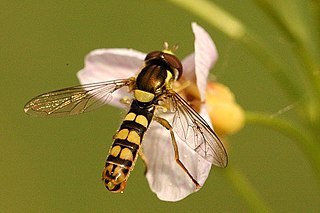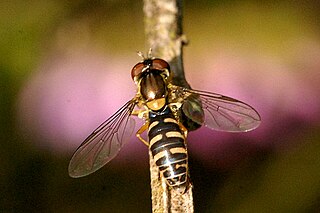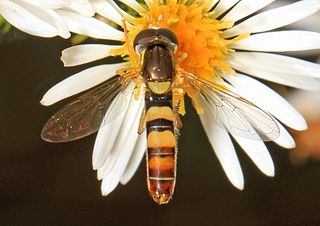
Hoverflies, also called flower flies or syrphids, make up the insect family Syrphidae. As their common name suggests, they are often seen hovering or nectaring at flowers; the adults of many species feed mainly on nectar and pollen, while the larvae (maggots) eat a wide range of foods. In some species, the larvae are saprotrophs, eating decaying plant and animal matter in the soil or in ponds and streams. In other species, the larvae are insectivores, preying on aphids, thrips, and other plant-sucking insects.

The Syrphinae constitute one of the three subfamilies of the fly family Syrphidae. Most larvae of this subfamily feed on aphids. It is a monophyletic group with more than 1,600 species.

Sphaerophoria is a genus of hoverflies. Species slender 5.6-12mm long with extremely large hemispherical male terminalia after which the common name globetail has been created. There are bright yellow markings on head and thorax and usually on the abdomen but some species have a black abdomen. They can be found worldwide but are common in North America, Europe, Asia and Australia. There are over 73 described species.

Sphaerophoria scripta, the long hoverfly, is a species of hoverfly belonging to the family Syrphidae.

Sphaerophoria interrupta is a Palearctic species of hoverfly.

Sphaerophoria fatarum is a European species of hoverfly.

Allograpta is a very large and diverse genus of hoverflies present throughout the world except most of the palearctic region. The adults are brightly coloured flower pollinators and most larvae have a predatory feeding mode involving soft-bodied sternorrhynchans. Certain species have diverged from this and their larvae have been found to be leaf-miners, stem-borers or pollen-feeders.

Neoascia is a genus of small black and yellow or mostly black flies with a narrow abdomen near the thorax. They occur mainly in damp places among low herbage. The larva of Neosascia are flattened without oral hooks and a have a short posterior spiracular process or "tail" rat-tailed that is saprophagous. In 1925 Curran reviewed the genus Neoascia. In this work a key is provided and ten species are described including four new species some of which have later been determined to be synonyms.
Exallandra is a subgenus of hoverflies in the subfamily Syrphinae, within the genus Sphaerophoria.
Sphaerophoria beattiei is a species of hoverfly belonging to the genus Sphaerophoria. It is endemic to the island of Saint Helena in the South Atlantic. It was originally considered the only member of the genus Loveridgeana but was found to be nested within Sphaerophoria in a DNA based phylogenetic analysis, along with three other species found in South Africa. Almost nothing is known of its biology other than it pollinated now extinct flora on Saint Helena including the Saint Helena olive.
Sphaerophoria bankowskae is a European species of hoverfly.

Sphaerophoria contigua is a species of syrphid fly in the family Syrphidae. It is a predator of aphids.
Sphaerophoria pyrrhina is a species of syrphid fly in the family Syrphidae.

Sphaerophoria philanthus is a species of syrphid fly in the family Syrphidae. It is found in Europe.
Neoascia sphaerophoria is a species of Hoverfly in the family Syrphidae.
Sphaerophoria asymmetrica , the asymmetric globetail , is a common species of syrphid fly observed across northern North America. Hoverflies can remain nearly motionless in flight. The adults are also known as flower flies for they are commonly found on flowers from which they get both energy-giving nectar and protein rich pollen. The larvae feed on aphids.

Sphaerophoria bifurcata, the symmetric globetail, is a species of syrphid fly in the family Syrphidae. The larvae of this genus are predators of aphids and other small hymenoptera. The larvae of this particular species is not known.










